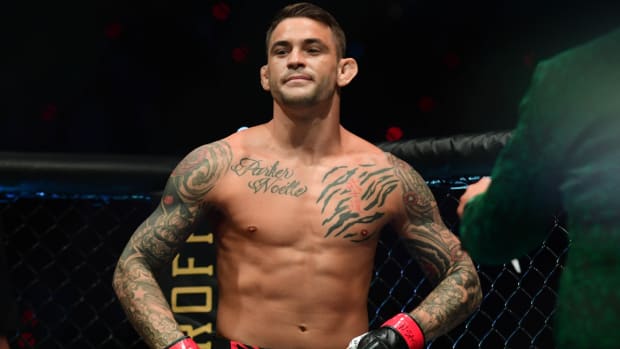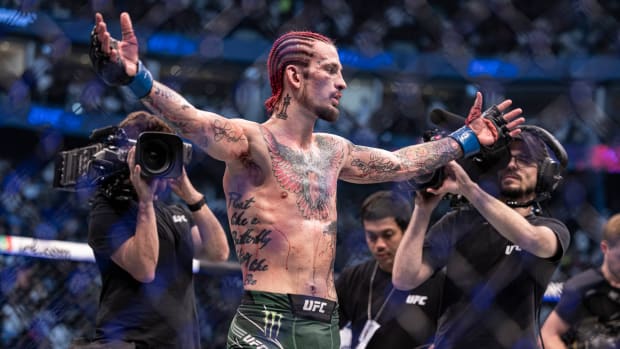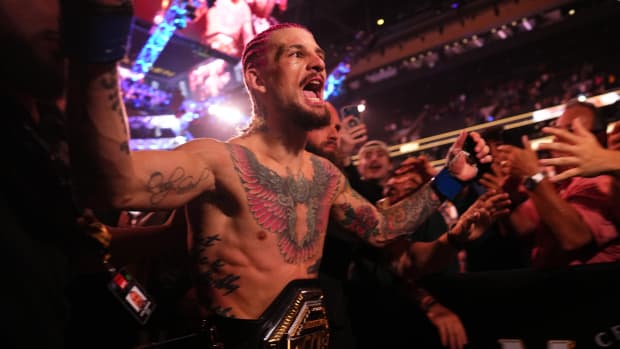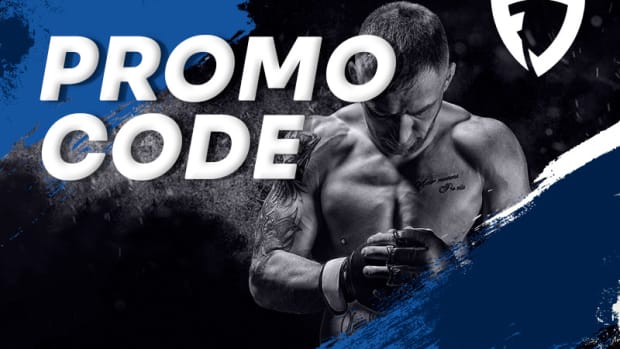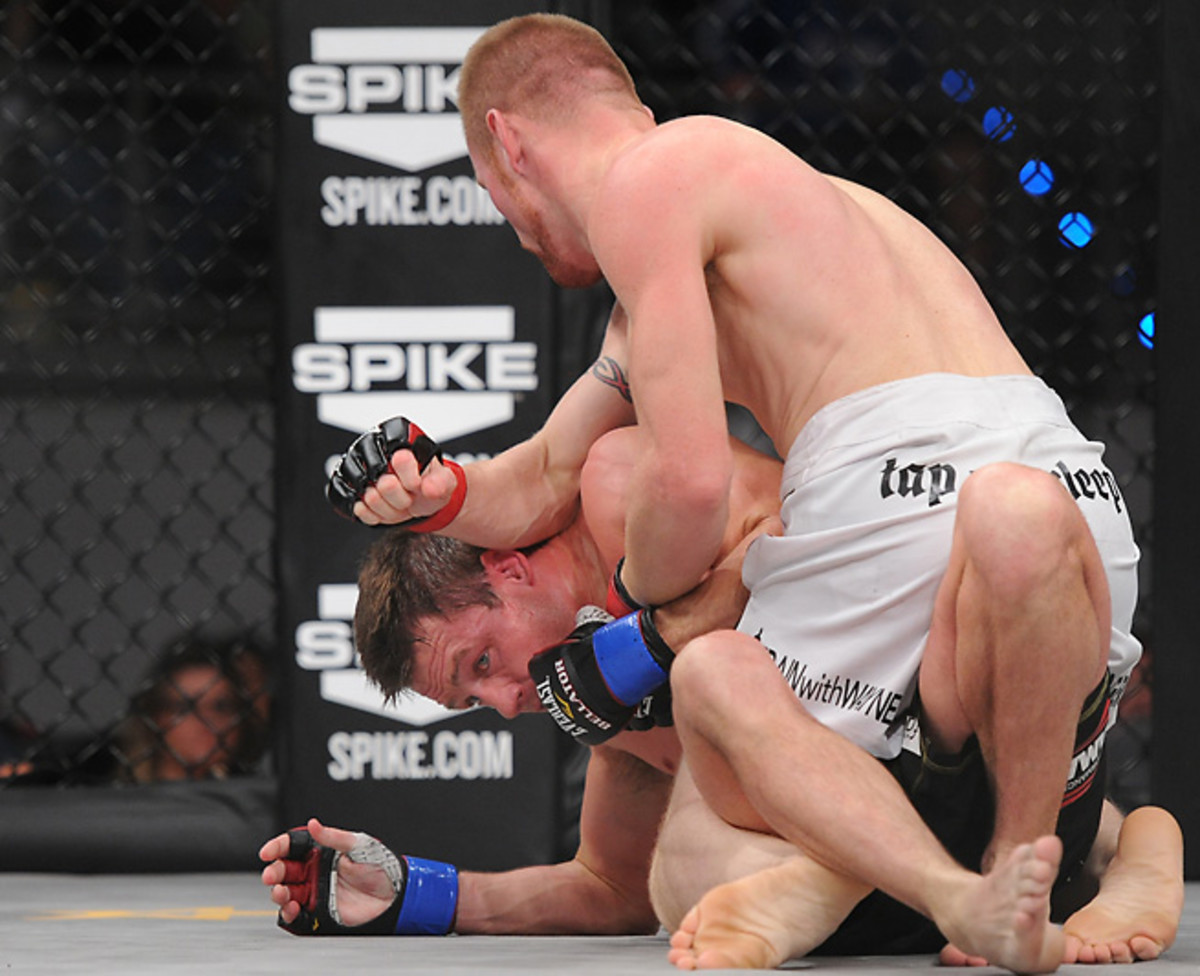
Spike TV president Kevin Kay expounds on the rise of Bellator

Unheralded fighters like Joseph Warren (black trunks) and Owen Evinger have shown up on Spike TV.
JC Salas/Icon SMI
If it's Thursday, it must be time for Bellator MMA.
OK, not this week and not for the next several, either. On the first Thursday of this month, the mixed martial arts promotion ended its eighth season with a bang. Pat Curran put on an electrifying performance in defending his featherweight championship and middleweight Doug Marshall and featherweight Frodo Khasbulaev earned title shots with victories in tournament finals. Though the fighting won't resume until the Bellator Summer Series of four-man tourneys begins in June, Bellator is undoubtedly succeeding.
Now is a time for Bellator to bask in the glow of its first season on Spike. The former television home of the UFC is part of Viacom, which in 2011 bought a majority share in Bjorn Rebney's five-year-old MMA company. At the time, Spike had just lost UFC broadcast rights to Fox and was looking to stay in the fight business. Bellator spent a year and a half with fellow Viacom outlet MTV2 before switching to Spike in January.
The move has been a boon to the formerly struggling company. Since Strikeforce folded in January, Bellator has essentially become the RC Cola to the UFC's Coke. (Bellator doesn't have the brand name to draw a Pepsi comparison). Spike announced last week that over the course of the season Bellator averaged 861,000 viewers, about four times as many as watched the last two seasons on MTV2.
We had questions about the numbers, because there are so many moving parts when one tries to assess ratings. Spike is in around 98 million homes, for example, while MTV2 is in 80 million ... but still mostly in standard definition. And Spike has been a player in the MMA game for as long as the game has been played, while MTV2 has been, well, we're not quite sure what the channel is best known for. (It's certainly not music.) So SI.com sat down with Spike president Kevin Kay the other day to talk ratings, business goals and what makes fighting so appealing on TV:
SI.com: So the numbers are in for Bellator's first season on Spike, and they're better than what Bellator was doing on MTV2. Is that such a surprise, though, considering how many more homes your channel is in?
Kevin Kay: Obviously, we thought we would do much better than MTV2, if only because we'd have more distribution. And being in HD is a big step up for sports fans. We also have a better ability to promote Bellator to mixed martial arts fans, putting promos in the shows on Spike as opposed to the shows on MTV2, which wasn't set up for mixed martial arts. But the numbers are even better than we expected. Over a million people each week were watching Bellator, when you count rebroadcasts. That's a great place to start.
SI.com: Spike also has another advantage over MTV2: the pedigree of having aired mixed martial arts for a long time, and therefore being identified with the sport.
Kay: That was part of our marketing campaign: Mixed martial arts is coming home. We do feel Spike has a heritage of being the first to put mixed martial arts on a major cable distribution platform. We were very successful with the UFC, and we felt like mixed martial arts fans were still with us. Throughout last year, we ran UFC programming because we still had the rights to the library. We kind of kept the slot warm, in a way. Then Bellator stepped in, and what did they do to keep the momentum going? They put on great fights. From Pat Curran and Michael Chandler and Ben Askren fighting like champions to Emanuel Newton knocking out Mo [Lawal], every week had something great. And for mixed martial arts fans, great fights make for great ratings.
SI.com: You mention Newton's upset of Lawal, which some saw as a downer for Bellator because the light heavyweight tournament lost a charismatic, and high-priced, star. But the flip side of that is that Emanuel Newton made a name for himself.
Kay: When Mo lost, I jumped out of my seat and said, "Oh my god." I wanted Mo to win that fight. We'd invested in him. But it wasn't the worst thing that ever happened to Bellator. It might be the best thing that ever happened. Emanuel Newton winning that fight was a hugely surprising moment, and because of that, it ended up on SportsCenter. The next week, the ratings go up by 200,000 people because everyone suddenly had a recognition that something cool happened on Bellator. Look, you don't want to see a guy you signed for a lot of money and put a lot of faith behind get knocked out, but it turned out to be not such a bad a thing.
SI.com: It certainly highlighted the unpredictability of the tournament format Bellator has become known for.
Kay: I think it completely legitimized the tournament format. Everyone had been writing, "Oh, they set this thing up so that Mo would face Babalu [Sobral] in the final. They're making that fight." Well, you know what, fellows? It didn't work out that way. Stuff happens in tournaments. And that unpredictability is what we're trying to sell. People want to see how it plays out. And in Mo's case, when he fights again in the summer people will tune in to see what he's going to do differently. Is he going to actually hold his hands up next time? That'd be good.
SI.com: Was the tournament format a big selling point for Spike getting into the Bellator business?
Kay: Definitely. As we first were looking around for MMA programming, when we knew the UFC deal was going south, it occurred to us that if you just go to another promoter who makes fights, you're going to be accused of being a UFC also-ran. All of us at Spike liked the idea of the tournaments, not just because it's different from what the UFC does but because it's the way other sports operate, from the professional playoffs to the NCAA brackets.
SI.com: Is the Bellator slogan "Where Title Shots Are Earned, Not Given" a slap at the UFC, which has become prone to making title fights based more on marketing than merit? They're now hyping a prime example of that, Jon Jones defending his light heavyweight belt against Chael Sonnen, who hasn't fought as a 205-pound fighter in six years and is coming off a loss at middleweight. That kind of matchmaking isn't possible in Bellator, is it?
Kay: No, but we're not saying that what the UFC does is wrong. Obviously, what they do is spectacular, and they're great at it. Bellator just has a different way of doing it. And I like being different. More important, I'm not a big fan of people talking themselves into fights. Sports fans want to see the best fight the best. You don't get in the Super Bowl because you won last year. You've got to go through the whole tournament again.
SI.com: Bellator is an underdog, in a sense, the No. 2 promotion in an MMA business dominated by the UFC. But the UFC was an underdog itself, in terms of its place in the sports world, back when Spike first started airing "The Ultimate Fighter." How different is it trying to promote the underdog now as opposed to back in the day?
Kay: Well, you don't have to explain the sport anymore. Part of our challenge back in the early UFC days -- one of the reasons why we did the reality series before we did any live fights -- was to set the table and explain the various disciplines and skill sets involved. Today, you can just show the fights, and viewers understand what's going on.
The biggest challenge back when we started with the UFC was getting sponsors. I remember going into rooms and showing clips of what people were then calling cage fighting -- or human cockfighting, even -- and sponsors would look at you like you were out of your mind. It took a bunch of years to get mainstream sponsors into the sport, because they had to be convinced that it was regulated and safe. We don't have that challenge today. There are still companies that will not sponsor MMA, but there's a broad base of sponsors across a lot of categories. And that's to the benefit of Spike, to the benefit of Bellator, and to the benefit of the fighters.
SI.com: You speak with a kind of "one for all, all for one" tone, as if building the sport is the main goal. So I'm wondering what you envision for Bellator. Is it to surpass the UFC and become No. 1, or do you just operate in your own silo, simply focusing on making Bellator as big as you can make it?
Kay: Yeah, we're just going to make it as big as we can make it. We're not trying to steal market share form the UFC. In boxing, there's Golden Boy and there's Top Rank, and everybody makes money. We recognize that the UFC is the market leader, but Bellator is the second-largest promotion in the world, and it has the support of Viacom and the marketing machine of Viacom and Spike. So I don't look at Bellator as an underdog.
I believe that mixed martial arts is still in its infancy. It's been on widely distributed cable TV, and now network TV on Fox, for just eight years. That's the infancy of a sport. The fan base is growing, with new people finding the sport every day. Look, I didn't know anything about this sport eight years ago, and now I can't watch enough fights. My family wants to send me out of the house sometimes. I've had people ask, "Aren't you worried that you're going to burn people out with so many fights on TV?" No, I'm not. Baseball has a 162-game schedule, plus playoffs. People watch a lot of sports. The last thing I'm worried about is whether there are enough sports fans.
SI.com: What about those sports fans who tune in to Spike for the Bellator fights a couple of minutes early and, instead of MMA, the first thing they see is pro wrestling? Any concern that having Bellator and Impact Wrestling back to back might confuse people?
Kay: I have less concern now than I used to. When MMA was in its infancy, I worried that people would confuse the two. But I feel like people do understand the difference now. Sure, there still are people out there -? I see them in focus groups every once in a while ? who believe that wrestling is real, but it's a small group. What I'm more concerned about is that some wrestling fans don't watch anything else. They come for wrestling and then leave the channel. So is Impact delivering its viewers to Bellator, or do they turn off the TV once wrestling is over? I think that does happen, but I still believe Impact is the best lead-in for Bellator.
SI.com: OK, just one last thing: In the wake of the big stink over in the UFC after Matt Mitrione made some vile comments about transgender fighter Fallon Fox and was suspended, I'm wondering if Bellator and Spike have a formal code of conduct to deal with such transgressions.
Kay: We have zero tolerance for gay bashing and misogyny. It's not acceptable. I think we've made it very clear to all of our talent, whether on Impact or our reality shows or Bellator, that that kind of behavior will not be tolerated. Viacom has a history of being socially engaged and in the forefront of gay rights. Diversity is very important to us as a company. I think that was a very unfortunate situation, but it was one guy, and the UFC did the right thing. That's exactly what we would do.
